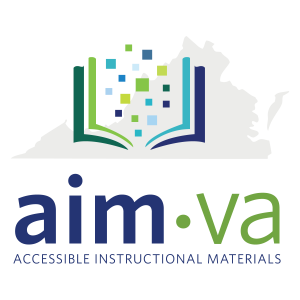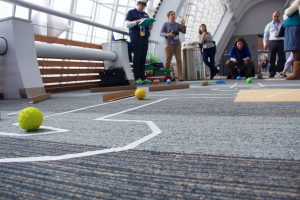 There are big and exciting changes coming to Virginia’s K-12 students who struggle to effectively read printed text. AIM-VA, Virginia’s accessible materials producer, just announced updated eligibility requirements that will make it easier for school divisions to access alternate print materials and allow more students greater access to alternate formats.
There are big and exciting changes coming to Virginia’s K-12 students who struggle to effectively read printed text. AIM-VA, Virginia’s accessible materials producer, just announced updated eligibility requirements that will make it easier for school divisions to access alternate print materials and allow more students greater access to alternate formats.
AIM-VA, through a grant from the Virginia Department of Education, provides accessible materials to eligible Virginia K-12 students with an Individualized Education Program. Accessible instructional materials or AIM are alternative print materials converted into specialized formats like ePub, accessible PDF, or braille. Research shows that these materials can positively impact a wide variety students by improving grades, increasing motivation, or building reading independence. Got a text-to-speech reader or app that allows students to customize text? Great, all you need is an accessible format to read! That’s where AIM-VA comes in.
There are two requirements that must be met to assure a student is eligible for AIM-VA materials.
- The student has an Individualized Education Program (IEP) that indicates the student may benefit from using alternative print materials for reading.
- The student has a print disability due to one of the following:
- Low Vision/Blindness
- Physical Disabilities
- Other Disabilities
This is where we start to get excited about the new changes to AIM-VA eligibility requirements! A student is considered to have a print disability if they cannot effectively read print because of a visual, physical, perceptual, developmental, cognitive, or learning disability. While AIM-VA previously required a medical doctor as the competent authority, the new eligibility update allows school divisions to self-identify ‘competent authorities’ within in their division to confirm a print disability, such a special education teacher, school psychologist or occupational therapist. While this update necessitates division preparation and commitment, it will also allow LEAs to provide AIM for students in the classroom more efficiently and effectively.
TL;DR?* For those who have used AIM-VA in the past, students no longer need a doctor’s note to receive AIM-VA materials!
The AIM-VA team is incredibly happy to be able to make this announcement and hope these changes make it easier to access AIM-VA materials. If you have any questions please contact call or email at: 866-926-1789 or AIMVA@gmu.edu
Note: AIM-VA is accessed by using an official Virginia public school email address. School personnel are able to create an account and order AIM for eligible students by visiting the AIM-VA Ordering Portal.
*too long, didn't read






